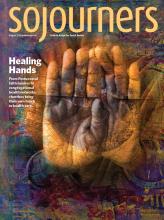THIS IS A very personal column. Last December I was diagnosed with prostate cancer. There were no symptoms, just a routine blood test. I was on a conference call when the doctor phoned with the biopsy results, but I continued on with the other call assuming I could return it later to hear that there were no problems. There were problems, he told me, and I would need to see a surgeon.
I felt incredulous about the news. I was about to launch a book tour and everything seemed to be in control. Sojourners was involved in intense advocacy work around immigration reform, gun violence, and the budget/sequester battles. There had to be a mistake, or surely some convenient treatment would suffice. Certainly, I would work this all out privately, and stay on schedule for everything else. But then came further testing and discussions of medical options—and anxiety began to grow.
The tour for my latest book, On God’s Side, had to be postponed without announcing why. I kept the health news to a small circle of family, friends, and senior staff, and I did my best to go on as if this wasn’t happening. But it was.
My care shifted to the research center at the National Institutes of Health. There, I took part in a new program using resolution MRI to guide surgical decisions. Such opportunities are available to anyone (people can find out about the work of NIH on its website—sadly, this critical work is being severely cut in the sequester). The NIH staff’s extraordinary knowledge of cancer was immediately evident, as was the wonderful care they showed me.
Read the Full Article
